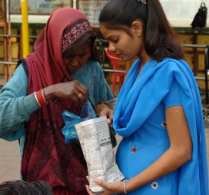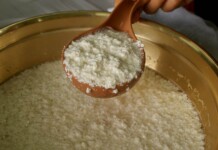 Every month more than 100 kilos (one quintal) of polythene bags are used to carry offerings into the famous Ram temple of Orchha. The bags end up choking cows, piling up in the soil as litter, and clogging drains causing waste water to overflow. Now, Indian youth from Orchha are campaigning for a polybag free town and giving pilgrims eco-friendly bags to carry instead.
Every month more than 100 kilos (one quintal) of polythene bags are used to carry offerings into the famous Ram temple of Orchha. The bags end up choking cows, piling up in the soil as litter, and clogging drains causing waste water to overflow. Now, Indian youth from Orchha are campaigning for a polybag free town and giving pilgrims eco-friendly bags to carry instead.
Last week, a group of boys and girls collected about three kilos of polythene bags from pilgrims and gave them handmade, paper bags in exchange while educating them about the environmental advantages. The Friends of Orchha Youth Club campaign aims to keep Orchha clean, eco-friendly and beautiful.
The organizer of the campaign, Asha D’Souza of Sarthak, a social service organization, said that this action would not only prevent pollution but also give employment to many local women in making paper bags.
It takes 300 years for polythene to degrade; burning them produces cancer-causing gases; and far too many cows die daily in India after having consumed these very bags.
Many people expressed their whole-hearted support for this initiative of the Friends of Orchha and admired the role the youth played in it. Charles Maclean, of Portland, Oregon, and www.philanthropynow.com participated actively in the campaign as well. While the young people spoke to the Indians, their friends from abroad, including, Louk Vreeswijk, interacted with the foreign tourists explaining the initiative. The action was then repeated a few days later at the main market place.
Bag Exchange activists recycled all the plastic bags collected. Temple guards even got involved, smiling and becoming converts to the cause of reducing pollution and protecting the environment by helping in the activity– and inspiring others to do the same.
Here’s how you can do the same where you live:
21 Quick Tips for Success
1. Find an enthusiastic, savvy youth champion that will partner with an adult
2. Tap the youth-to-youth network to recruit additional Bag Team Members
3. Craft with youth input, a 15-second story the youth will tell to all those they encounter (sample below)
4. Train youth and adult partners in telling the story quickly, respectfully, concisely with a smile
5. Discuss how to handle difficult situations
6. Pick a site where there is high plastic bag use (Temple, shops, airport)
7. Practice the story and process before the big day and work out the problems
8. Collect newspapers and get paper glue to construct the bags, stencil the bags with your groups name/contact information
9. Make banners and other signs to announce what you’re doing and get permission to post them at the site
10. Arrange for tables, chairs and food for the Bag Team
11. Circle the team on site to quickly discuss their hopes, intentions and connect them to each other
12. Develop a press release (see sample) and hand deliver, email or fax to key media 2-3 weeks in advance and request an advance story
13. Make follow-up phone calls to media 2 days before event to remind them of the story opportunity
14. Select and train an adult spokesperson to talk with the media on site or in-advance and afterward
15. Arrange for video and still picture taking to document the Bag Exchange
16. Select and prepare a youth to be interviewed by the media
17. Have fun engaging your fellow citizens in a good earth friendly cause
18. Debrief the effort immediately afterward focusing on what worked and what could work better
19. Arrange for a celebration immediately after the event
20. Do a follow-up news article
21. Repeat as often as needed to stabilize behavior change
“Hello (or, Namaste). May I take your polybag and give you a paper bag instead? We’ll have yours recycled. The Friends of Orchha youth club wants to keep our town free of plastic waste. Did you know that it takes 300 years for polythene to degrade? We don’t want it in our fields, we don’t want it in our drains and we don’t want it in our streets. Several hundred cows die daily in India after having consumed these very bags. If burnt in the open they give off smoke that can cause cancer. Yet, about 100 kilos is used every month to bring offerings into this temple. Please help us to stop this dangerous practice. Thank you.”
Story submitted by: Charles Bernard Maclean, PhD,
Orchha, Madhya Pradesh, India




















Kid Power
I love it when kids and youth get involved in initiatives like this, it’s very powerful!